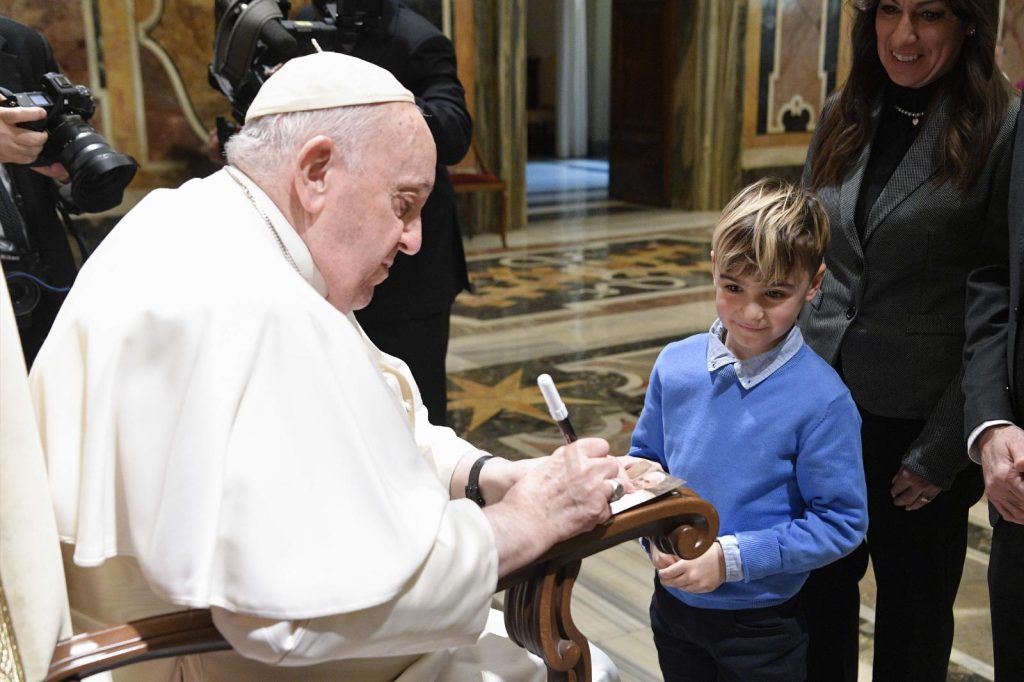
VATICAN CITY. Marriage is not a ceremony, a social event, a mere formality, or an abstract ideal, Pope Francis said.
Marriage, according to Christian revelation, is a gift from God that joins a man and woman together so that “the two shall become one flesh,” and “what God has joined together, no human being must separate,” the pope said, quoting the Gospel of Matthew.
Marriage is also “an extraordinary good, a good of extraordinary value for everyone: for the spouses themselves, for their children, for all families with whom they form relationships, for the entire Church, for all of humanity,” the pope told members of the Roman Rota, a Vatican-based tribunal that deals mainly with marriage cases and requests for marriage annulments.
“Every true marriage, even a non-sacramental one, is a gift of God to the spouses,” the pope told the tribunal members Jan. 27. “Matrimony is always a gift! Conjugal fidelity rests on divine fidelity; conjugal fruitfulness is based on divine fruitfulness. Man and woman are called to accept this gift and freely correspond to it with the reciprocal gift of self.”
As the members inaugurated the tribunal’s judicial year, Pope Francis said he wanted to focus his talk on marriage “because there is a great need in the Church and in the world to rediscover the meaning and value of the conjugal union between a man and a woman on which the family is based.”
In fact, part of the reason for the “crisis that is affecting so many families is the practical ignorance – personal and collective – regarding marriage,” he said.
St. John Paul II described the celebration of the sacrament of matrimony as offering a “new heart” so that “the couples are not only able to overcome ‘hardness of heart,’ but also and above all they are able to share the full and definitive love of Christ, the new and eternal covenant made flesh,” the pope said, quoting from the 1981 document, “Familiaris Consortio.”
“Marriage according to Christian revelation is not a ceremony or a social event, no,” Pope Francis said. “It is neither a formality nor an abstract ideal. It is a reality with its own precise consistency, not a form of mere emotional satisfaction that can be constructed in any way or modified at will.”
At the same time, the pope said, “marriage should not be idealized, as if it existed only where there are no problems.”
God’s plan “is always fulfilled imperfectly” in human hands, he said, and yet the Lord is present in the family “with all their daily troubles and struggles, joys and hopes.”
Life as a family makes it “difficult to pretend and lie; we cannot hide behind a mask,” he said. “If that authenticity is inspired by love, then the Lord reigns there, with His joy and His peace.”
For married couples in crisis, “the Church, both pastors and other faithful, accompanies them with love and hope, seeking to support them,” he said. “A fundamental resource for facing and overcoming crises is to renew awareness of the gift received in the sacrament of marriage, an irrevocable gift, a source of grace on which we can always count.”
Pope Francis said there is a need “to rediscover the permanent reality of marriage as a bond,” especially since the “bond” is often thought of as an “imposition, a burden, a ‘tether’ in opposition to the authenticity and freedom of love.”
“If, on the other hand, the bond is understood precisely as a bond of love, then it reveals itself as the core of marriage, as a divine gift that is the source of true freedom and that safeguards married life,” he said.
The Church can assist engaged and married couples to deepen their love and overcome difficulties not just by helping them accept its doctrinal teachings and its valuable spiritual resources, he said. The Church can also help by offering “practical programs, sound advice, strategies based on experience and psychological guidance.”
The indissolubility of marriage often is considered to be only an “ideal,” he said, while “the mindset that believes marriage lasts as long as there is love tends to prevail.”
But true marital love cannot be reduced to just sentimental feelings or “selfish satisfactions,” the pope said. “Instead, matrimonial love is inseparable from marriage itself, in which human love, fragile and limited, meets divine love, always faithful and merciful.”
God “supports spouses with his grace: ‘As I have loved you, love one another,’” the pope said, but it is also “a gift entrusted to their freedom, with its limits and its lapses, so that the love between husband and wife needs continual purification and maturation, mutual understanding and forgiveness,” emphasizing that crises are not resolved by hiding them, but through mutual forgiveness.









